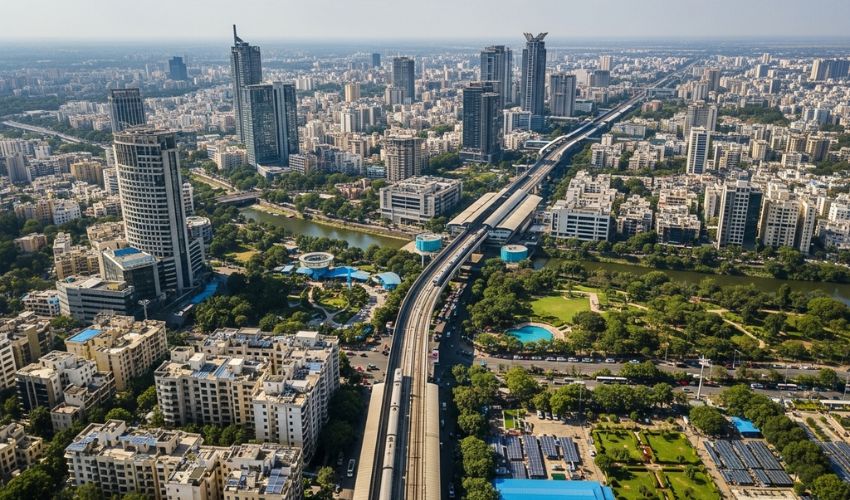
Smart City Pune: What It Means for Future Homebuyers and Investors
By Kolte-Patil Team | Last Updated: January 21, 2026
Pune’s Smart City mission is reshaping urban living through advanced infrastructure, digital governance, clean energy, and sustainable mobility. For homebuyers and investors, these upgrades mean higher property values, better quality of life, and strong long-term returns — making Pune one of India’s most promising real estate destinations. Additionally, investors focusing on the western side of the city are increasingly making purchase decisions due to the upcoming Panvel airport and faster connectivity following the infrastructure upgrade of the missing link.
What Is a Smart City and Why Is Pune Leading the Way?
A smart city is more than just a technologically advanced urban space — it’s a city designed to deliver a higher standard of living through integrated digital services, sustainable infrastructure, and citizen-centric governance.
Pune was among the first 20 cities selected under the Government of India’s Smart City Mission in 2016. Since then, it has emerged as a model for other cities, thanks to its proactive approach in implementing smart governance, sustainable practices, and tech-driven infrastructure.
Here’s why Pune stands out:
- Citizen-first approach: Projects are designed based on community feedback and real needs.
- Investment in technology: From real-time traffic management to public Wi-Fi zones, tech adoption is widespread.
- Strong sustainability push: Initiatives include renewable energy adoption, green building codes, and eco-friendly waste management.
According to Pune Smart City Development Corporation Ltd. (PSCDCL), significant investment has been made in upgrading the city’s infrastructure since the mission began.
Smart Infrastructure in Pune: The Key Upgrades
Digital Services & E-Governance
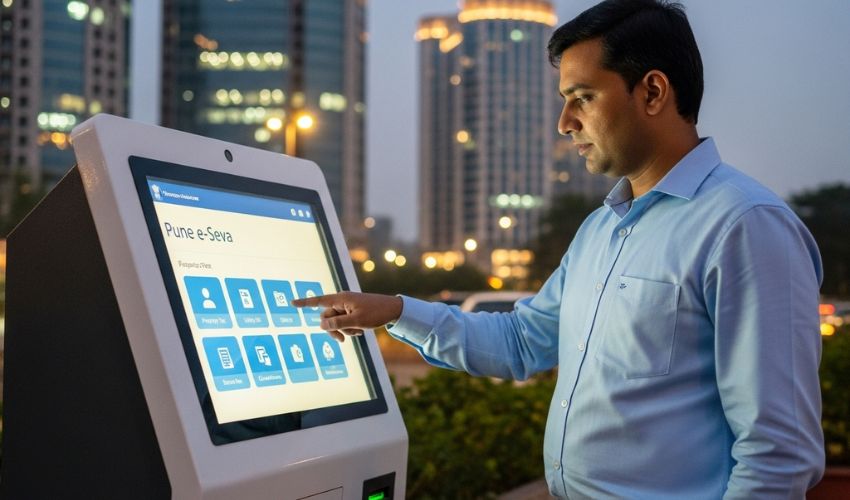
Pune’s governance model is evolving into a fully digital experience:
- PMC App: A digital portal for residents to report civic issues and access municipal services.
- Smart Kiosks: Interactive kiosks across the city providing quick access to government services.
- Public Wi-Fi: Deployed in key areas to offer internet access, with the service currently being updated.
These initiatives not only make life easier for residents but also attract tech professionals looking for a city with modern conveniences.
Clean Energy & Sustainability
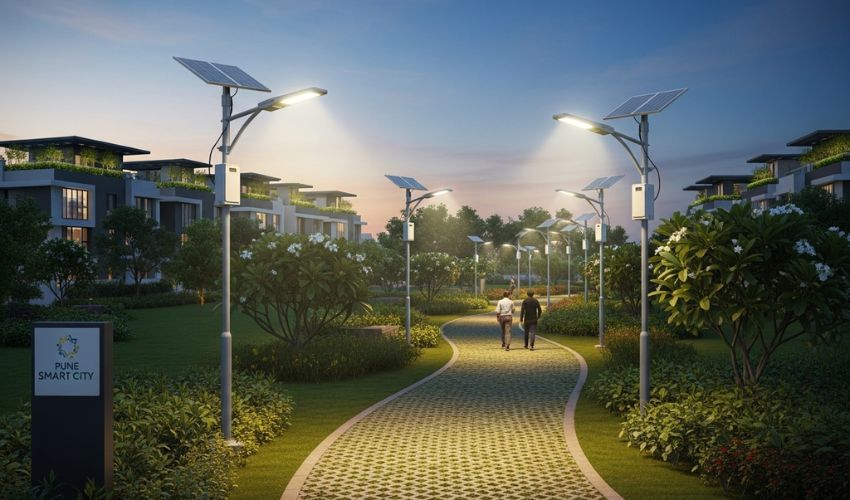
Pune is actively moving towards a low-carbon future:
- Solar-powered streetlights to cut electricity costs and emissions.
- Promotion of energy-efficient building designs for new projects.
- Waste-to-energy plants converting solid waste into usable energy.
Urban Mobility & Transport Innovations
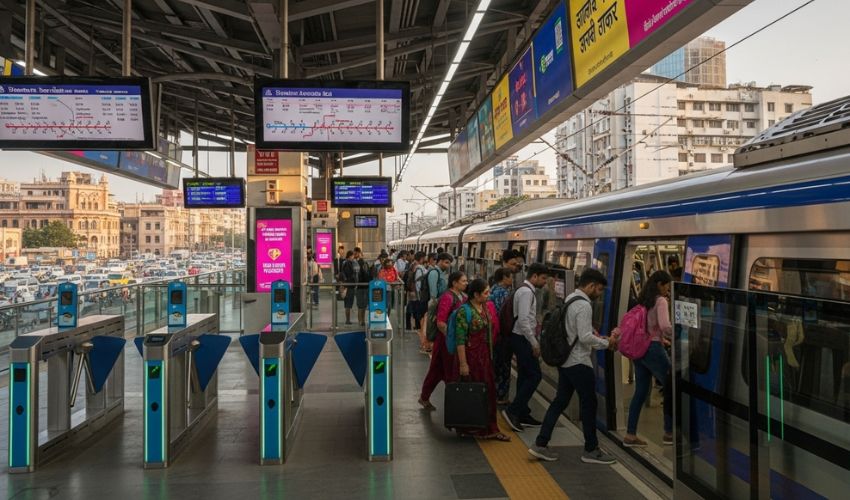
Mobility is a top priority under the smart city plan:
- Pune Metro: Connecting key IT and residential hubs.
- Smart traffic lights that optimize signal timing based on real-time congestion data.
- Public bike-sharing schemes making last-mile connectivity affordable and eco-friendly.
How Smart City Pune Is Impacting Property Values –
Infrastructure upgrades directly influence real estate appreciation. In Pune, smart city developments have:
- Increased buyer demand in connected localities.
- Driven 15–20% price appreciation in metro-connected neighborhoods over the past three years.
- Boosted development and accessibility in areas along the Pune Ring Road, further enhancing infrastructure and long-term property value.
- Attracted NRI and institutional investors seeking long-term gains.
Why This Is the Right Time to Buy a Flat in Pune
Pune is at a pre-completion stage for many major smart city projects — which means prices are still competitive, especially in emerging suburbs like Wagholi, Kharadi, NIBM and Baner.
Comparing with other smart cities:
- Pune vs Ahmedabad: Pune offers a stronger IT job market.
- Pune vs Indore: Pune has better connectivity to Mumbai and global markets.
- Pune vs Bangalore: Pune’s property prices are still relatively affordable while offering similar lifestyle advantages.
Buying now means you can lock in current prices and benefit from appreciation once projects are completed.
Kolte Patil’s Contribution to Smart Living in Pune
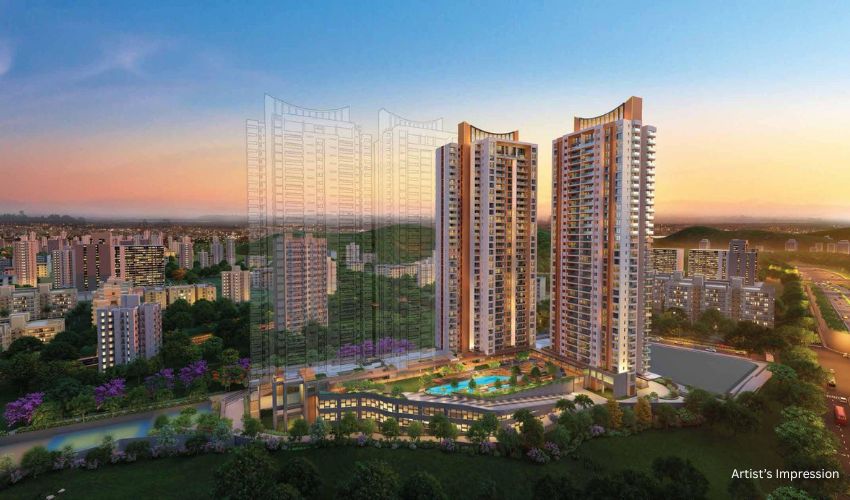
Kolte Patil Developers has been a frontrunner in incorporating smart living features in its projects. Highlights include:
- Energy-efficient homes with sustainable building materials.
- EV charging stations in residential complexes.
- Home automation options for lighting, security, and appliances.
For example, Kolte Patil’s 24K Altura in Baner offers smart amenities, making it an attractive choice for first-time buyers and young families seeking 3 BHK flats in Pune with future-ready infrastructure.
Pune vs Other Smart Cities — How It Stands Out
While many Indian cities are adopting smart initiatives, Pune’s edge lies in:
- A balanced mix of IT, manufacturing, and education sectors driving job growth.
- Strong public participation in city planning.
- Higher liveability index scores compared to other tier-1 cities.
This combination ensures Pune remains a sustainable investment hotspot for years to come.
FAQs
1. Why is Pune considered a smart city?
Pune is a smart city due to its advanced digital governance, improved public transport (like Pune Metro), renewable energy adoption, and efficient waste management. The Smart City Pune mission focuses on citizen-friendly technology, green mobility, and sustainable urban planning — enhancing both liveability and property value.
2. What are the key features of Smart City Pune?
Smart City Pune includes:
- Smart traffic management systems
- E-governance services for residents
- Pune Metro and electric bus networks
- Solar-powered infrastructure
- Integrated waste and water management systems
3. How does Smart City Pune benefit homebuyers?
Smart City developments boost homebuyer benefits through better infrastructure, higher liveability, and increased property appreciation. Enhanced mobility, green spaces, and digital services make buying a flat in Pune a long-term investment with strong resale value.
4. Will property prices increase in Pune because of smart city projects?
Yes. Smart infrastructure in Pune — like metro expansion, smart roads, and green energy systems — typically drives higher demand and appreciation. Areas near these developments often see property value growth over a few years, making them attractive for both end-users and investors.
5. Which areas in Pune benefit the most from smart city projects?
Top areas benefiting include:
- Hinjewadi & Baner (IT hubs + metro connectivity)
- Kharadi & Wagholi (budget-friendly housing + growth potential)
- Shivajinagar & Aundh (infrastructure upgrades + high liveability)
6. How does smart city infrastructure improve daily life in Pune?
Smart infrastructure improves daily life through:
- Reduced traffic congestion via smart signals
- Reliable public transport (metro, electric buses)
- Faster civic services through e-governance
- Better waste and water management
- Cleaner, greener public spaces
7. Is investing in property in Smart City Pune better than in other cities?
Yes, Pune offers a strong balance of affordability, infrastructure, and economic growth compared to other smart cities like Bangalore or Ahmedabad. Lower entry costs, high job creation, and sustainable planning make it an appealing choice for both investors and end-users.
8. What smart technologies are used in Pune’s real estate projects?
Developers in Pune integrate:
- Home automation systems
- Smart lighting and energy management
- EV charging stations
- Digital security and surveillance
- Water recycling and solar power systems
9. How does Pune Smart City support green living?
The city promotes green living with solar-powered lighting, electric buses, rainwater harvesting, and tree plantation drives. Many housing projects now include landscaped green spaces, energy-efficient designs, and eco-friendly building materials.
10. What are the challenges in Pune’s Smart City mission?
Challenges include:
- Delays in project execution
- High infrastructure investment needs
- Balancing rapid urbanisation with sustainability
- Public awareness and adoption of digital services
11. How do I choose the right property in Smart City Pune?
When choosing a property:
- Check proximity to smart infrastructure projects
- Evaluate developer credibility and amenities
- Compare pricing with similar areas
- Assess long-term growth potential for resale and rental income
Conclusion
Pune’s smart city transformation is not just a tech upgrade — it’s a lifestyle revolution. The city is poised for exponential growth, offering investors and homebuyers the chance to be part of a forward-thinking urban ecosystem.If you’re ready to buy a flat in Pune or explore property for sale in Pune that aligns with the smart city vision, Kolte Patil’s projects offer the perfect mix of location, value, and future-readiness.




